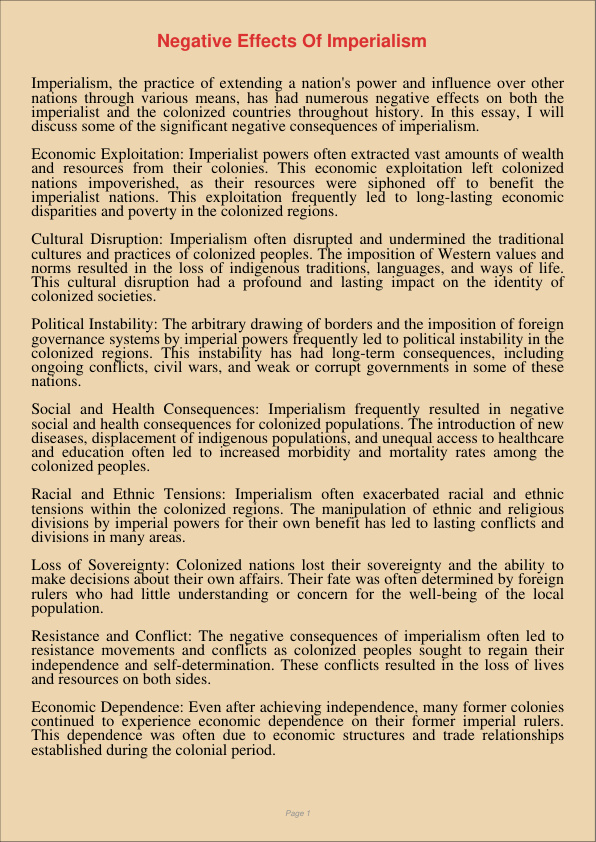Negative Effects Of Imperialism
Jan 12, 2024
negative effects
imperialism
Human Resources
Religion and Theology

Imperialism, the practice of extending a nation’s power and influence over other nations through various means, has had numerous negative effects on both the imperialist and the colonized countries throughout history. In this essay, I will discuss some of the significant negative consequences of imperialism.
Economic Exploitation: Imperialist powers often extracted vast amounts of wealth and resources from their colonies. This economic exploitation left colonized nations impoverished, as their resources were siphoned off to benefit the imperialist nations. This exploitation frequently led to long-lasting economic disparities and poverty in the colonized regions.
Cultural Disruption: Imperialism often disrupted and undermined the traditional cultures and practices of colonized peoples. The imposition of Western values and norms resulted in the loss of indigenous traditions, languages, and ways of life. This cultural disruption had a profound and lasting impact on the identity of colonized societies.
Political Instability: The arbitrary drawing of borders and the imposition of foreign governance systems by imperial powers frequently led to political instability in the colonized regions. This instability has had long-term consequences, including ongoing conflicts, civil wars, and weak or corrupt governments in some of these nations.
Social and Health Consequences: Imperialism frequently resulted in negative social and health consequences for colonized populations. The introduction of new diseases, displacement of indigenous populations, and unequal access to healthcare and education often led to increased morbidity and mortality rates among the colonized peoples.
Racial and Ethnic Tensions: Imperialism often exacerbated racial and ethnic tensions within the colonized regions. The manipulation of ethnic and religious divisions by imperial powers for their own benefit has led to lasting conflicts and divisions in many areas.
Loss of Sovereignty: Colonized nations lost their sovereignty and the ability to make decisions about their own affairs. Their fate was often determined by foreign rulers who had little understanding or concern for the well-being of the local population.
Resistance and Conflict: The negative consequences of imperialism often led to resistance movements and conflicts as colonized peoples sought to regain their independence and self-determination. These conflicts resulted in the loss of lives and resources on both sides.
Economic Dependence: Even after achieving independence, many former colonies continued to experience economic dependence on their former imperial rulers. This dependence was often due to economic structures and trade relationships established during the colonial period.
Environmental Degradation: The exploitation of natural resources during the imperialist era often resulted in environmental degradation, including deforestation, soil erosion, and pollution. These environmental problems continue to affect many former colonies today.
Legacy of Injustice: The negative effects of imperialism have left a legacy of injustice that continues to shape the world. The inequalities and injustices perpetuated during the imperialist era still impact the lives of many people today.
In conclusion, imperialism has had a wide range of negative effects on both the imperialist and colonized nations, including economic exploitation, cultural disruption, political instability, social and health consequences, racial and ethnic tensions, loss of sovereignty, and more. The consequences of imperialism continue to influence global politics and socioeconomic conditions to this day.